- Home
- Andrzej Sapkowski
Blood of Elves Page 23
Blood of Elves Read online
Page 23
“No, not the sergeants,” said Demawend of Aedirn coldly. “It will be young and gifted officers who have long waited for such an opportunity and have been trained by Emhyr for an equally long time. Those whom the older marshals stopped from taking command, prevented from being promoted. The young, gifted commanders about whom we already hear. Those who crushed the uprisings in Metinna and Nazair, who rapidly broke up the rebels in Ebbing. Commanders who appreciate the roles of out-flanking manoeuvres, of far-reaching cavalry raids, of swift infantry marches and of landing operations from the sea. They use the tactics of crushing assaults in specific directions, they use the newest siege techniques instead of relying on the uncertainties of magic. They must not be underestimated. They are itching to cross the Yaruga and prove that they have learned from the mistakes of their old marshals.”
“If they have truly learned anything,” Henselt shrugged, “they will not cross the Yaruga. The river estuary on the border between Cintra and Verden is still controlled by Ervyll and his three strongholds: Nastrog, Rozrog and Bodrog. They cannot be seized just like that – no new technology is going to help them there. Our flank is defended by Ethain of Cidaris’s fleet, and thanks to it we control the shore. And also thanks to the pirates of Skellige. Jarl Crach an Craite, if you remember, didn’t sign a truce with Nilfgaard, and regularly bites them, attacking and setting fire to their maritime settlements and forts in the Provinces. The Nilfgaardians have nicknamed him Tirth ys Muire, Sea Boar. They frighten children with him!”
“Frightening Nilfgaardian children,” smiled Vizimir wryly, “will not ensure our safety.”
“No,” agreed Henselt. “Something else will. Without control of the estuary or the shore and with a flank exposed, Emhyr var Emreis will be in no position to ensure provisions reach any detachments he might care to send across the Yaruga. What swift marches, what cavalry raids? Ridiculous. The army will come to a standstill within three days of crossing the river. Half will lay siege to the stronghold and the rest will be slowly dispersed to plunder the region in search of fodder and food. And when their famed cavalry has eaten most of its own horses, we’ll give them another Sodden. Damn it, I’d like them to cross the river! But don’t worry, they won’t.”
“Let us say,” Meve of Lyria said suddenly, “that they do not cross the Yaruga. Let us say that Nilfgaard will simply wait. Now let us consider: who would that suit, them or us? Who can let themselves wait and do nothing and who can’t?”
“Exactly!” picked up Vizimir. “Meve, as usual, does not say much but she hits the nail on the head. Emhyr has time on his hands, gentlemen, but we don’t. Can’t you see what is happening? Three years ago, Nilfgaard disturbed a small stone on the mountainside and now they are calmly waiting for an avalanche. They can simply wait while new stones keep pouring down the slope. Because, to some, that first small stone looked like a boulder which would be impossible to move. And since it turned out that a mere touch sufficed to set it rolling, others appeared for whom an avalanche would prove convenient. From the Grey Mountains to Bremervoord, elven commandos rove the forests – this is no longer a small group of guerrilla fighters, this is war. Just wait and we’ll see the free elves of Dol Blathanna rising to fight. In Mahakam the dwarves are rebelling, the dryads of Brokilon are growing bolder and bolder. This is war, war on a grand scale. Civil war. Domestic. Our own. While Nilfgaard waits… Whose side you think time is on? The Scoia’tael commandos have thirty- or forty-year old elves fighting for them. And they live for three hundred years! They have time, we don’t!”
“The Scoia’tael,” admitted Henselt, “have become a real thorn in the backside. They’re paralysing my trade and transport, terrorising the farmers… we have to put an end to this!”
“If the non-humans want war, they will get it,” threw in Foltest of Temeria. “I have always been an advocate of mutual agreement and co-existence but if they prefer a test of strength then we will see who is the stronger. I am ready. I undertake to put an end to the Squirrels in Temeria and Sodden within six months. Those lands have already run with elven blood once, shed by our ancestors. I consider the blood-letting a tragedy, but I do not see an alternative – the tragedy will be repeated. The elves have to be pacified.”
“Your army will march against the elves if you give the order,” nodded Demawend. “But will it march against humans? Against the peasantry from which you muster your infantry? Against the guilds? Against the free towns? Speaking of the Scoia’tael, Vizimir described only one stone in the avalanche. Yes, yes, gentlemen, do not gape at me like that! Word is already going round the villages and towns that on the lands already taken by the Nilfgaard, peasants, farmers and craftsmen are having an easier life, freer and richer, and that merchants’ guilds have more privileges… We are inundated with goods from Nilfgaardian manufactories. In Brugge and Verden their coin is ousting local currency. If we sit and do nothing we will be finished, at odds with our neighbours, embroiled in conflict, tangled up in trying to quell rebellions and riots, and slowly subdued by the economic strength of the Nilfgaardians. We will be finished, suffocating in our own stuffy parochial corner because – understand this – Nilfgaard is cutting off our route to the South and we have to develop, we have to be expansive, otherwise there won’t be enough room here for our grandchildren!”
Those gathered said nothing. Vizimir of Redania sighed deeply, grabbed one of the chalices standing on the table and took a long draught. Rain battered against the windows throughout the prolonged silence, and the wind howled and pounded against the shutters.
“All the worries of which we talk,” said Henselt finally, “are the work of Nilfgaard. It is Emhyr’s emissaries who are inciting the non-humans, spreading propaganda and calling for riots. It is they who are throwing gold around and promising privileges to corporations and guilds, assuring barons and dukes they will receive high positions in the provinces they plan to create in place of our kingdoms. I don’t know what it’s like in your countries, but in Kaedwen we’ve been inundated with clerics, preachers, fortune-tellers and other shitty mystics all appearing out of the blue, all preaching the end of the world…”
“It’s the same in my country,” agreed Foltest. “Damn it, for so many years there was peace. Ever since my grandfather showed the clerics their place and decimated their ranks, those who remained stuck to useful tasks. They studied books and instilled knowledge in children, treated the sick, took care of the poor, the handicapped and the homeless. They didn’t get mixed up in politics. And now all of a sudden they’ve woken up and are yelling nonsense to the rabble – and the rabble is listening and believes they know, at last, why their lives are so hard. I put up with it because I’m less impetuous than my grandfather and less sensitive about my royal authority and dignity than he was. What sort of dignity or authority would it be, anyway, if it could be undermined by the squealings of some deranged fanatic? But my patience is coming to an end. Recently the main topic of preaching has been of a Saviour who will come from the south. From the south! From beyond the Yaruga!”
“The White Flame,” muttered Demawend. “White Chill will come to be, and after it the White Light. And then the world will be reborn through the White Flame and the White Queen… I’ve heard it, too. It’s a travesty of the prophecy of Ithlinne aep Aevenien, the elven seeress. I gave orders to catch one cleric who was going on about it in the Vengerberg market place and the torturer asked him politely and at length how much gold the prophet had received from Emhyr for doing it… But the preacher only prattled on about the White Flame and the White Queen… the same thing, to the very end.”
“Careful, Demawend,” grimaced Vizimir. “Don’t make any martyrs. That’s exactly what Emhyr is after. Catch all the Nilfgaardian agents you please, but do not lay hands on clerics, the consequences are too unpredictable. They still are held in regard and have an important influence on people. We have too much trouble with the Squirrels to risk riots in our towns or war against our own peasants.”
> “Damn it!” snorted Foltest, “let’s not do this, let’s not risk that, we mustn’t this, we mustn’t that… Have we gathered here to talk about all we can’t do? Is that why you dragged us all to Hagge, Demawend, to cry our hearts out and bemoan our weakness and helplessness? Let us finally do something! Something must be done! What is happening has to be stopped!”
“I’ve been saying that from the start.” Vizimir pulled himself up. “I propose action.”
“What sort of action?”
“What can we do?”
Silence fell again. The wind blustered, the shutters banged against the castle wall.
“Why,” said Meve suddenly, “are you all looking at me?”
“We’re admiring your beauty,” Henselt mumbled from the depths of his tankard.
“That too,” seconded Vizimir. “Meve, we all know you can find a solution to everything. You have a woman’s intuition, you’re a wise wo—”
“Stop flattering me.” The Queen of Lyria clasped her hands in her lap and fixed her gaze on the darkened tapestries with their depictions of hunting scenes. Hounds, extended in a leap, were turning their muzzles up towards the flanks of a fleeing white unicorn. I’ve never seen a live unicorn, thought Meve. Never. And I probably never will.
“The situation in which we find ourselves,” she said after a while, tearing her eyes away from the tapestry, “reminds me of long, winter evenings in Rivian Castle. Something always hung in the air. My husband would be contemplating how to get his hands on yet another maid-of-honour. The marshal would be working out how to start a war which would make him famous. The wizard would imagine he was king. The servants wouldn’t feel like serving, the jester would be sad, gloomy and excruciatingly dull, the dogs would howl with melancholy and the cats sleep, careless of any mice that might be scuttling around on the table. Everybody was waiting for something. Everyone was scowling at me. And I… then I… I showed them. I showed them all what I was capable of, in a way that made the very walls shake and the local grizzly bears wake in their winter lairs. And any silly thoughts disappeared from their heads in a trice. Suddenly everyone knew who ruled.”
No one uttered a word. The wind howled a little louder. The guards on the buttresses outside hailed each other casually. The patter of drops on the panes in the lead window frames grew to a frenzied staccato.
“Nilfgaard is watching and waiting,” continued Meve slowly, toying with her necklace. “Nilfgaard is observing us. Something is hanging in the air, silly thoughts are springing up in many heads. So let us show them what we are capable of. Let us show them who is really king here. Let us shake the walls of this great castle plunged into a winter torpor!”
“Eradicate the Squirrels,” said Henselt quickly. “Start a huge joint military operation. Treat the non-humans to a blood bath. Let the Pontar, Gwenllech and Buina flow with elven blood from source to estuary!”
“Send a penal expedition to smother the free elves of Dol Blathanna,” added Demawend, frowning. “March an interventionary force into Mahakam. Allow Ervyll of Verden a chance, at last, to get at the dryads in Brokilon. Yes, a blood bath! And any survivors – to the reservations!”
“Set Crach an Craite at the Nilfgaardian shores,” picked up Vizimir. “Support him with Ethain of Cidaris’s fleet, let them go ravaging from the Yaruga to Ebbing! A show of strength—”
“Not enough.” Foltest shook his head. “All of that is still not enough. We need… I know what we need.”
“So tell us!”
“Cintra.”
“What?”
“To take Cintra back from the Nilfgaardians. Let us cross the Yaruga, be the first to attack. Now, while they don’t expect it. Let us throw them out, back beyond the Marnadal.”
“How? We’ve just said that it’s impossible for an army to cross the Yaruga—”
“Impossible for Nilfgaard. But we have control of the river. We hold the estuary in our grasp, and the supply routes, and our flank is protected by Skellige, Cidaris and the strongholds in Verden. For Nilfgaard, getting forty or fifty thousand men across the river is a considerable effort. We can get far more across to the left bank. Don’t gape, Vizimir. You wanted something to put an end to the waiting? Something spectacular? Something which will make us true kings again? That something is Cintra. Cintra will bind us and our rule together because Cintra is a symbol. Remember Sodden! If it were not for the massacre of that town and Calanthe’s martyrdom, there would not have been such a victory then. The forces were equal – no one counted on our crushing them like that. But our armies threw themselves at their throats like wolves, like rabid dogs, to avenge the Lioness of Cintra. And there are those whose fury was not quelled by the blood spilt on the field of Sodden. Remember Crach an Craite, the Wild Boar of the Sea!”
“That is true,” nodded Demawend. “Crach swore bloody vengeance on Nilfgaard. For Eist Tuirseach, killed at Marnadal. And for Calanthe. If we were to strike at the left bank, Crach would back us up with all the strength of Skellige. By the gods, this has a chance at success! I back Foltest! Let us not wait, let us strike first, let us liberate Cintra and chase those sons-of-bitches beyond the Amell pass!”
“Slow down,” snarled Henselt. “Don’t be in such a hurry to tug the lion’s whiskers, because this lion is not dead yet. That is for starters. Secondly, if we are the first to strike, we will put ourselves in the position of aggressors. We will be breaking the truce to which we all put our seals. We will not be backed by Niedamir and his League, we will not be backed by Esterad Thyssen. I don’t know how Ethain of Cidaris will react. An aggressive war will also be opposed by our guilds, merchants, nobles… And above all, the wizards. Do not forget the wizards!”
“The wizards won’t back an assault on the left bank,” confirmed Vizimir. “The peace agreement was the work of Vilgefortz of Roggeveen. It is well known that his plan was for the armistice to gradually turn into permanent peace. Vilgefortz will not back a war. And the Chapter, believe me, will do whatever Vilgefortz wishes. After Sodden he has become the most important person in the Chapter – let other magicians say what they will, Vilgefortz plays first fiddle there.”
“Vilgefortz, Vilgefortz,” bridled Foltest. “He has grown too large for us, that magician. Taking into account Vilgefortz’s and the Chapter’s plans – plans which I am not acquainted with anyway, and which I do not understand at that – is beginning to annoy me. But there is a way around that, too, gentlemen. What if it were Nilfgaard who was the aggressor? At Dol Angra for example? Against Aedirn and Lyria? We could arrange that somehow… could stage some tiny provocation… A border incident caused by them? An attack on a border fort, let us say? We will, of course, be prepared – we will react decisively and forcefully, with everybody’s full acceptance, including that of Vilgefortz and the entire Chapter of Wizards. And when Emhyr var Emreis turns his eyes from Sodden and Transriver, the Cintrians will demand their country back – all those the emigrants and refugees who are gathering themselves in Brugge under Vissegerd’s leadership. Nearly eight thousand of them are armed. Could there be a better spearhead? They live in the hope of regaining the country they were forced to flee. They are burning to fight. They are ready to strike the left bank. They await only the battle cry.”
“The battle cry,” bore out Meve, “and the promise that we will back them up. Because Emhyr can command eight thousand men at his border garrison; with that strength he won’t even have to send for relief troops. Vissegerd knows this very well and won’t move until he has the assurance that your armies, Foltest, reinforced by Redanian corps, will disembark on the left bank at his heels. But above all Vissegerd is waiting for the Lion Cub of Cintra. Apparently the queen’s granddaughter survived the slaughter. Allegedly, she was seen amongst the refugees, but the child mysteriously disappeared. The emigrants persist in their search for her… Because they need someone of royal blood to sit on their regained throne. Someone of Calanthe’s blood.”
“Nonsense,” said Foltest coldly
. “More than two years have passed. If the child has not been found by now, she’s dead. We can forget that myth. Calanthe is no more and there is no Lion Cub, no royal blood to whom the throne belongs. Cintra… will never again be what it was during the Lioness’s lifetime. Obviously, we cannot say that to Vissegerd’s emigrants.”
“So you are going to send Cintrian guerrillas to their deaths?” Meve narrowed her eyes. “In the line of attack? Not telling them that Cintra can only be reborn as a vassal country under your protectorship? You are proposing, to all of us, an attack on Cintra for your own gain? You have suborned Sodden and Brugge for yourself, are sharpening your teeth on Verden and now you have caught a whiff of Cintra, is that right?”
“Admit it, Foltest,” snapped Henselt. “Is Meve right? Is that why you are inciting us to this affair?”
“Come on, leave it.” The ruler of Temeria furrowed his noble brow and bristled angrily. “Don’t make me out as some conqueror dreaming of an empire. What are you talking about? Sodden and Brugge? Ekkehard of Sodden was my mother’s half-brother. Are you surprised that following his death the Free States brought the crown to me, his relative? Blood not water! And yes Venzlav of Brugge paid me homage as a vassal – but without coercion! He did it to protect his country because, on a fine day, he can see Nilfgaardian lances flashing on the left bank of the Yaruga!”

 something ends something begins sapkowski
something ends something begins sapkowski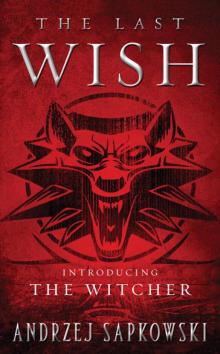 The Last Wish
The Last Wish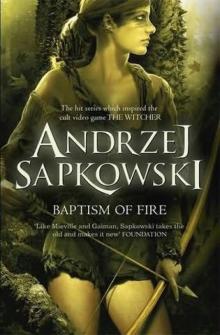 Baptism of Fire
Baptism of Fire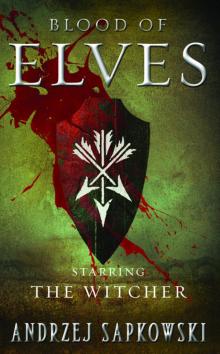 Blood of Elves
Blood of Elves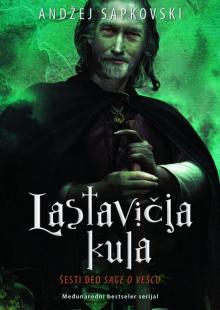 Lastavičja Kula
Lastavičja Kula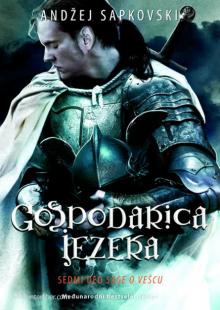 Gospodarica Jezera
Gospodarica Jezera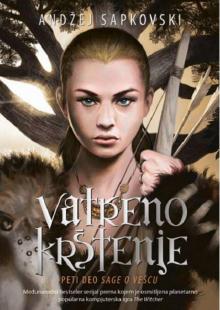 Vatreno Krštenje
Vatreno Krštenje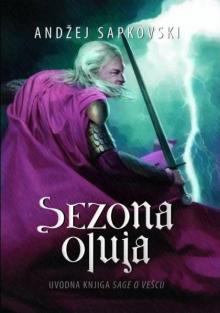 Sezona Oluja
Sezona Oluja Lady of the Lake
Lady of the Lake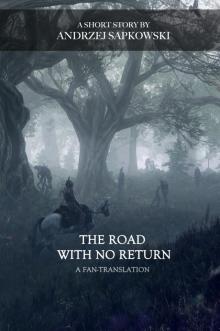 The Road With No Return
The Road With No Return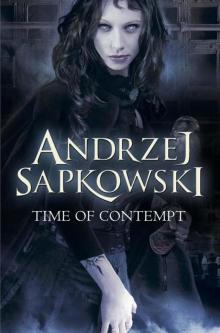 Time of Contempt
Time of Contempt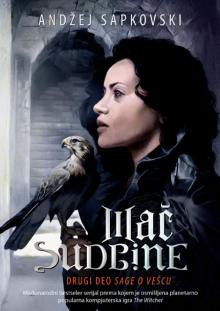 Mač Sudbine
Mač Sudbine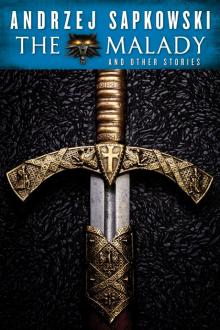 The Malady and Other Stories: An Andrzej Sapkowski Sampler
The Malady and Other Stories: An Andrzej Sapkowski Sampler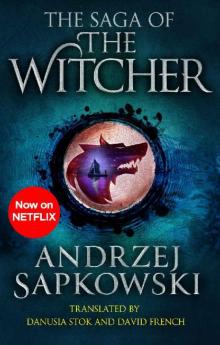 The Saga of the Witcher
The Saga of the Witcher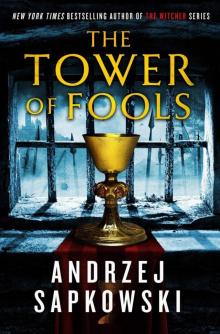 The Tower of Fools
The Tower of Fools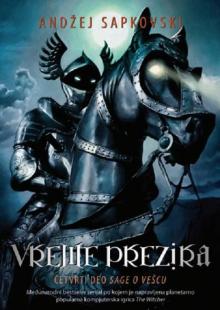 Vreme Prezira
Vreme Prezira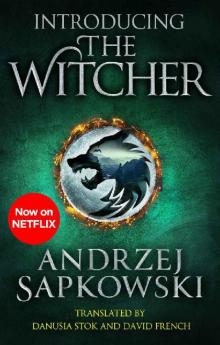 Introducing the Witcher
Introducing the Witcher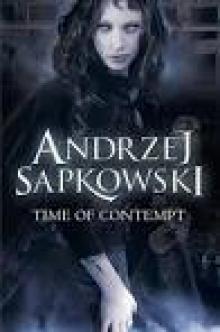 Stephen Hulin
Stephen Hulin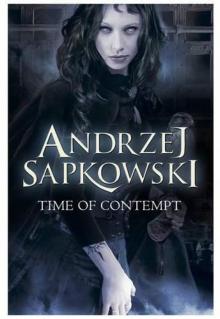 The Time of Contempt
The Time of Contempt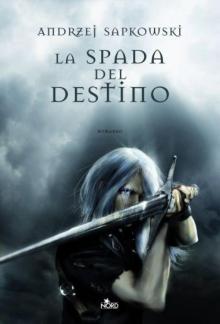 The Sword of Destiny
The Sword of Destiny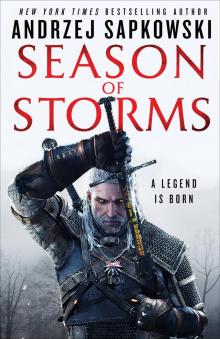 Season of Storms
Season of Storms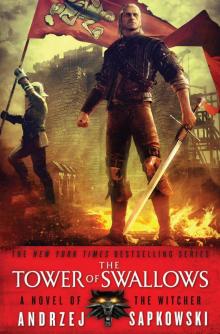 The Tower of Swallows
The Tower of Swallows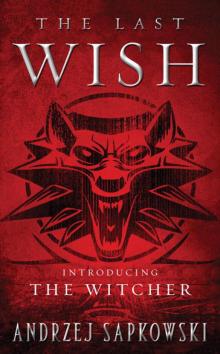 The Last Wish: Introducing The Witcher
The Last Wish: Introducing The Witcher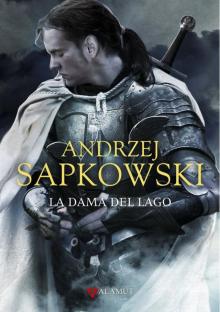 The Lady of the Lake
The Lady of the Lake